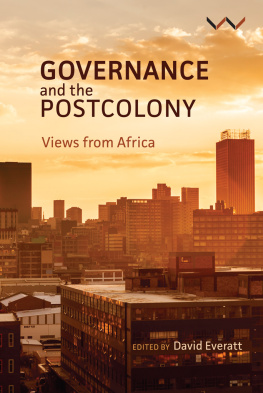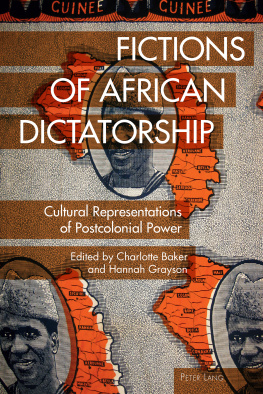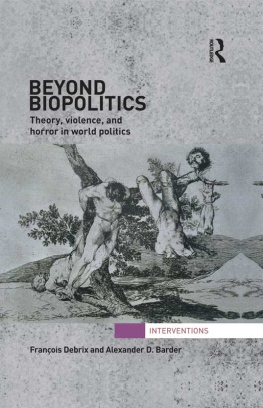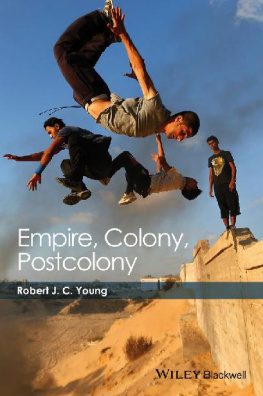Mbembe - On the Postcolony
Here you can read online Mbembe - On the Postcolony full text of the book (entire story) in english for free. Download pdf and epub, get meaning, cover and reviews about this ebook. City: Afrika;Berkeley, year: 2012;2001, publisher: University of California Press, genre: Romance novel. Description of the work, (preface) as well as reviews are available. Best literature library LitArk.com created for fans of good reading and offers a wide selection of genres:
Romance novel
Science fiction
Adventure
Detective
Science
History
Home and family
Prose
Art
Politics
Computer
Non-fiction
Religion
Business
Children
Humor
Choose a favorite category and find really read worthwhile books. Enjoy immersion in the world of imagination, feel the emotions of the characters or learn something new for yourself, make an fascinating discovery.

- Book:On the Postcolony
- Author:
- Publisher:University of California Press
- Genre:
- Year:2012;2001
- City:Afrika;Berkeley
- Rating:4 / 5
- Favourites:Add to favourites
- Your mark:
- 80
- 1
- 2
- 3
- 4
- 5
On the Postcolony: summary, description and annotation
We offer to read an annotation, description, summary or preface (depends on what the author of the book "On the Postcolony" wrote himself). If you haven't found the necessary information about the book — write in the comments, we will try to find it.
On the Postcolony — read online for free the complete book (whole text) full work
Below is the text of the book, divided by pages. System saving the place of the last page read, allows you to conveniently read the book "On the Postcolony" online for free, without having to search again every time where you left off. Put a bookmark, and you can go to the page where you finished reading at any time.
Font size:
Interval:
Bookmark:
On the Postcolony
Achille Mbembe

STUDIES ON THE HISTORY OF SOCIETY AND CULTURE
Victoria E. Bonnell and Lynn Hunt, Editors
1. Politics, Culture, and Class in the French Revolution, by Lynn Hunt
2. The People of Paris: An Essay in Popular Culture in the Eighteenth Century, by Daniel Roche
3. Pont-St-Pierre, 13981789: Lordship, Community, and Capitalism in Early Modern France, by Jonathan Dewald
4. The Wedding of the Dead: Ritual, Poetics, and Popular Culture in Transylvania, by Gail Kligman
5. Students, Professors, and the State in Tsarist Russia, by Samuel D. Kassow
6. The New Cultural History, edited by Lynn Hunt
7. Art Nouveau in Fin-de-Sicle France: Politics, Psychology, and Style, by Debora L. Silverman
8. Histories of a Plague Year: The Social and the Imaginary in Baroque Florence, by Giulia Calvi
9. Culture of the Future: The Proletkult Movement in Revolutionary Russia, by Lynn Mally
10. Bread and Authority in Russia, 19141921, by Lars T. Lih
11. Territories of Grace: Cultural Change in the Seventeenth-Century Diocese of Grenoble, by Keith P. Luria
12. Publishing and Cultural Politics in Revolutionary Paris, 17891810, by Carla Hesse
13. Limited Livelihoods: Gender and Class in Nineteenth-Century England, by Sonya O. Rose
14. Moral Communities: The Culture of Class Relations in the Russian Printing Industry, 18671907, by Mark Steinberg
15. Bolshevik Festivals, 19171920, by James von Geldern
16. Venices Hidden Enemies: Italian Heretics in a Renaissance City, by John Martin
17. Wondrous in His Saints: Counter-Reformation Propaganda in Bavaria, by Philip M. Soergel
18. Private Lives and Public Affairs: The Causes Clbres of Prerevolutionary France, by Sarah Maza
19. Hooliganism: Crime, Culture, and Power in St. Petersburg, 19001914, by Joan Neuberger
20. Possessing Nature: Museums, Collecting, and Scientific Culture in Early Modern Italy, by Paula Findlen
21. Listening in Paris: A Cultural History, by James H. Johnson
22. The Fabrication of Labor: Germany and Britain, 16401914, by Richard Biernacki
23. The Struggle for the Breeches: Gender and the Making of the British Working Class, by Anna Clark
24. Taste and Power: Furnishing Modern France, by Leora Auslander
25. Cholera in Post-Revolutionary Paris: A Cultural History, by Catherine J. Kudlick
26. The Women of Paris and Their French Revolution, by Dominique Godineau
27. Iconography of Power: Soviet Political Posters under Lenin and Stalin, by Victoria E. Bonnell
28. Fascist Spectacle: The Aesthetics of Power in Mussolinis Italy, by Simonetta Falasca-Zamponi
29. Passions of the Tongue: Language Devotion in Tamil India, 18911970, by Sumathi Ramaswamy
30. Crescendo of the Virtuoso: Spectacle, Skill, and Self-Promotion in Paris during the Age of Revolution, by Paul Metzner
31. Crime, Cultural Conflict, and Justice in Rural Russia, 18561914, by Stephen P. Frank
32. The Collective and the Individual in Russia: A Study in Practices, by Oleg Kharkhordin
33. What Difference Does a Husband Make? Women and Marital Status in Germany, by Elizabeth Heineman
34. Beyond the Cultural Turn: New Directions in the Study of Society and Culture, edited by Victoria E. Bonnell and Lynn Hunt
35. Cultural Divides: Domesticating America in Cold War Germany, by Uta G. Poiger
36. The Frail Social Body and Other Fantasies in Interwar France, by Carolyn J. Dean
37. Blood and Fire: Rumor and History in East and Central Africa, by Luise White
38. The New Biography: Performing Femininity in Nineteenth-Century France, by Jo Burr Margadant
39. France and the Cult of the Sacred Heart: An Epic Tale for Modern Times, by Raymond Jonas
40. Politics and Theater: The Crisis of Legitimacy in Restoration France, 18151830, by Sheryl Kroen
41. On the Postcolony, by Achille Mbembe
and the conclusion were translated by Steven Rendall.
was originally published as Provisional Notes on the Postcolony, Africa 62, 1 (1992), 337.
was originally published as La Chose et ses doubles dans la caricature camerounaise, Cahier dtudes africaines 36, 12 (1996), pp. 14370.
University of California Press
Berkeley and Los Angeles, California
University of California Press, Ltd.
London, England
2001 by the Regents of the University of California
Library of Congress Cataloging-in-Publication Data
Mbemb, J.-A., 1957
[Notes provisoires sur la postcolonie. English]
On the postcolony / Achille Mbembe.
p. cm. (Studies on the history of society and culture; 41)
Original title: Notes provisoires sur la postcolonie.
Includes bibliographical references and index.
ISBN 978-0-520-20435-5 (pbk : alk. paper)
1. Power (Social sciences)Africa. 2. PostcolonialismAfrica. 3. Subjectivity. I. Title. II. Series.
HN780.Z9 P66413 2001
302.3'096dc21
00-062854
Manufactured in Canada
15 14 13 12 11 10 09 08 07
13 12 11 10 9 8 7 6 5
The paper used in this publication meets the minimum requirements of ANSI / NISO Z390.48- 1992 (R 1997) (Permanence of Paper). 
No, they were not inhuman. Well, you know, that was the worst of itthis suspicion of their not being inhuman. It would come slowly to one. They howled and leaped, and spun, and made horrid faces; but what thrilled you was just the thought of their humanitylike yoursthe thought of your remote kinship with this wild and passionate uproar.
Speaking rationally about Africa is not something that has ever come naturally. Doing so, at this cusp between millenia, comes even less so. What is going on?
First, the African human experience constantly appears in the discourse of our times as an experience that can only be understood through a negative interpretation. Africa is never seen as possessing things and attributes properly part of human nature. Or, when it is, its things and attributes are generally of lesser value, little importance, and poor quality. It is this elementariness and primitiveness that makes Africa the world par excellence of all that is incomplete, mutilated, and unfinished, its history reduced to a series of setbacks of nature in its quest for humankind.
At another level, discourse on Africa is almost always deployed in the framework (or on the fringes) of a meta-text about the animalto be exact, about the beast: its experience, its world, and its spectacle. In this meta-text, the life of Africans unfolds under two signs.
First is the sign of the strange and the monstrousof what, even as it opens an appealing depth before us, is constantly eluding and escaping us. Attempts are made to discover its status, and to do so the first requirement is, apparently, to abandon our world of meaning; is not Africa to be understood for what it is, an entity with its peculiar feature that of shared roots with absolute brutality, sexual license, and death?
The other sign, in the discourse of our times, under which African life is interpreted is that of intimacy. It is assumed that, although the African possesses a self-referring structure that makes him or her close to being human, he or she belongs, up to a point, to a world we cannot penetrate. At bottom, he/she is familiar to us. We can give an account of him/her in the same way we can understand the psychic life of the
Next pageFont size:
Interval:
Bookmark:
Similar books «On the Postcolony»
Look at similar books to On the Postcolony. We have selected literature similar in name and meaning in the hope of providing readers with more options to find new, interesting, not yet read works.
Discussion, reviews of the book On the Postcolony and just readers' own opinions. Leave your comments, write what you think about the work, its meaning or the main characters. Specify what exactly you liked and what you didn't like, and why you think so.








